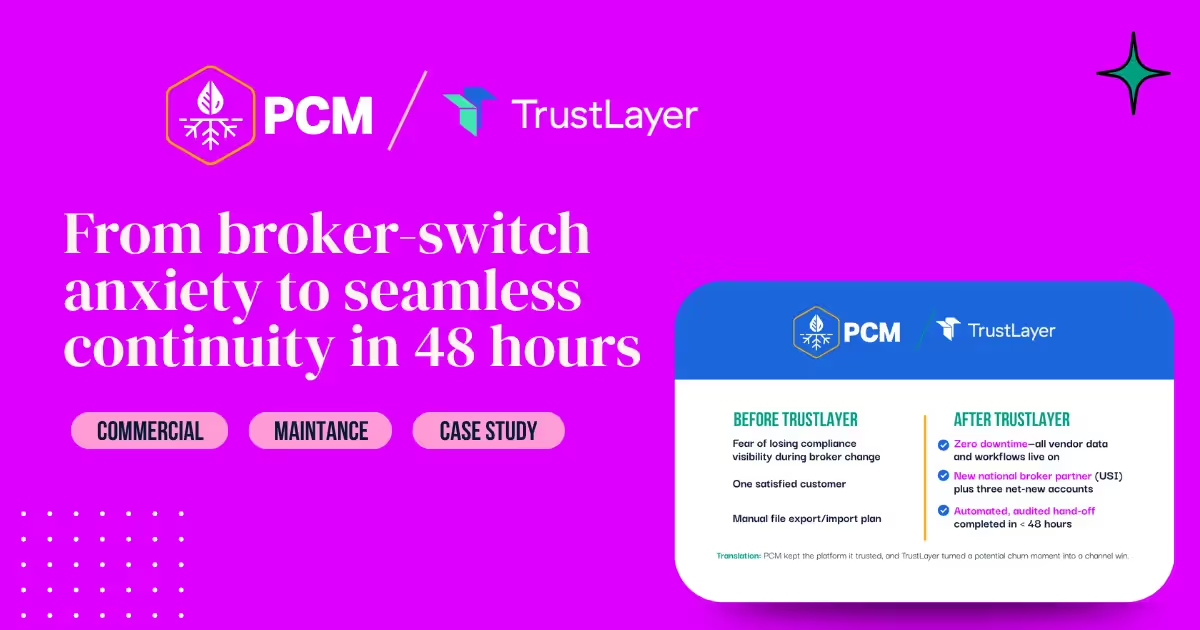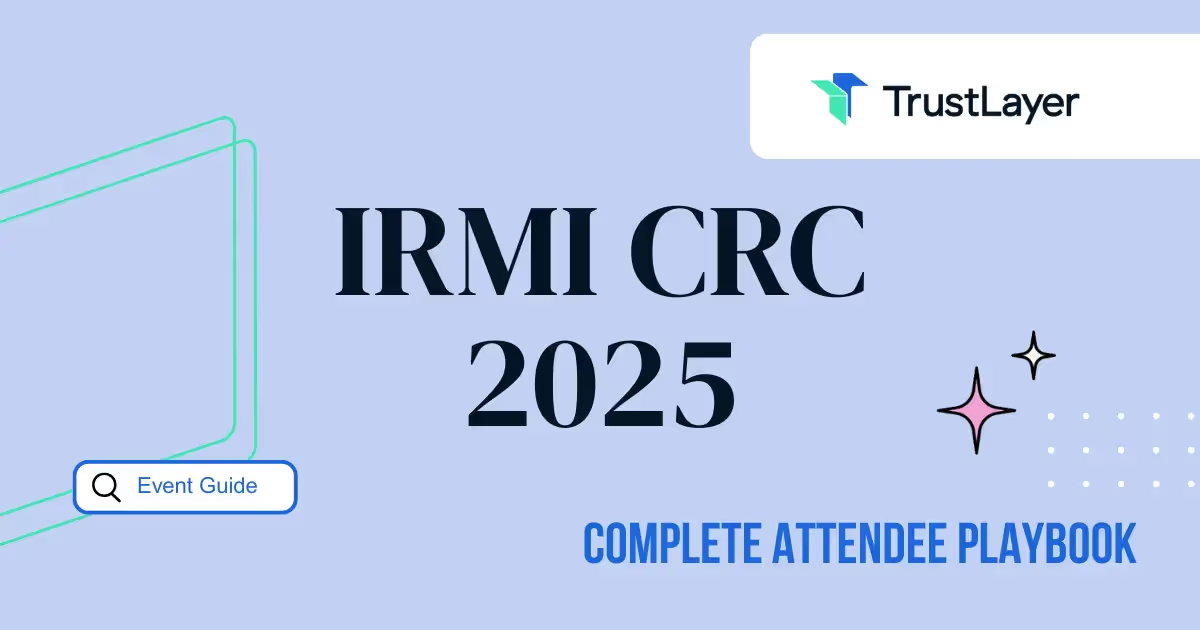Five Ways Insurance Tracking Saves Organizations Time
In today's complex business landscape, organizations face numerous challenges when it comes to managing insurance policies effectively. From juggling multiple policies to ensuring regulatory compliance, insurance tracking can often become an administrative nightmare. However, by implementing efficient insurance tracking systems, organizations can streamline their processes, reduce unnecessary costs, and save valuable time. In this article, we will explore the various ways insurance tracking can benefit organizations and pave the way for smoother operations.
Understanding the Concept of Insurance Tracking
Before delving into the time-saving benefits of insurance tracking, it is crucial to grasp the concept itself. Insurance tracking refers to the practice of monitoring and managing insurance policies and certificates of insurance (COIs) within an organization. By having a centralized system in place, businesses can ensure that their policies remain valid, up-to-date, and in compliance with industry standards.
Insurance tracking goes beyond simply keeping track of insurance policies. It involves a comprehensive approach to risk management, where organizations actively monitor their coverage to identify any gaps or potential issues. This proactive approach allows businesses to address any insurance-related concerns promptly, minimizing the chances of being caught off guard by unexpected events.
One of the primary goals of insurance tracking is to provide organizations with a clear understanding of their insurance portfolio. By maintaining a centralized database of policies and COIs, businesses can easily access and review their coverage details. This visibility enables them to make informed decisions regarding their insurance needs, such as identifying areas where additional coverage may be necessary or eliminating redundant policies.
The Role of Insurance Tracking in Organizations
Insurance tracking plays a pivotal role in organizations by providing them with the necessary tools to mitigate risks effectively. By keeping tabs on insurance policies, businesses can safeguard their assets, protect their employees, and shield themselves from potential litigation.
One of the key benefits of insurance tracking is the ability to ensure that all policies are up-to-date and compliant with industry standards. This is particularly important in regulated industries where non-compliance can result in severe penalties or legal consequences. By actively monitoring policy expiration dates and renewal requirements, organizations can avoid any lapses in coverage that may leave them vulnerable.
Furthermore, insurance tracking enables organizations to maintain strong relationships with their clients and partners. By showcasing their commitment to risk management, businesses can instill confidence in their stakeholders, demonstrating that they take their responsibilities seriously. This can be especially crucial for businesses that work closely with clients or partners who require proof of insurance as a prerequisite for collaboration.
Key Features of Effective Insurance Tracking Systems
Effective insurance tracking systems offer a range of features that help organizations optimize their processes and save valuable time. These features may include automated policy renewals, COI request and collection workflows, and expiration alerts.
Automated policy renewals are a time-saving feature that eliminates the need for manual intervention when it comes to renewing insurance policies. By setting up automated reminders and renewal processes, businesses can ensure that their coverage remains uninterrupted without the need for constant monitoring.
COI request and collection workflows streamline the process of obtaining certificates of insurance from vendors, contractors, or other third parties. Instead of manually requesting and tracking COIs, organizations can leverage automated workflows that send out requests, collect the necessary documentation, and update the system once the COIs are received. This not only saves time but also reduces the chances of missing critical documentation.
Expiration alerts are another valuable feature of insurance tracking systems. By setting up alerts for policy expirations, organizations can stay ahead of any potential gaps in coverage. These alerts can be configured to notify relevant stakeholders well in advance, giving them ample time to renew policies or seek alternative coverage options if necessary.
In conclusion, insurance tracking is a vital practice for organizations looking to effectively manage their insurance policies and mitigate risks. By implementing an efficient insurance tracking system, businesses can ensure that their coverage remains up-to-date, compliant, and aligned with their risk management strategies. With features such as automated renewals, streamlined COI workflows, and expiration alerts, insurance tracking systems offer valuable tools to optimize processes and save time.
The Time-Saving Benefits of Insurance Tracking
Now, let's explore the tangible ways in which insurance tracking can save organizations valuable time.
Insurance tracking is not just about ensuring compliance with policies and regulations. It also offers a range of time-saving benefits that can significantly streamline administrative tasks and enhance decision-making processes.
Streamlining Administrative Tasks
Manual administrative tasks, such as collecting and organizing Certificates of Insurance (COIs), can be time-consuming and prone to errors. Insurance tracking systems simplify these processes by automating data collection, generating reports, and providing real-time visibility into policy compliance.
Imagine the time and effort saved when insurance tracking software automatically collects COIs from vendors, verifies their validity, and organizes them in a centralized database. This eliminates the need for manual data entry and reduces the risk of overlooking important insurance documentation.
Furthermore, insurance tracking systems can send automated reminders to vendors when their policies are about to expire, ensuring that organizations always have up-to-date insurance information on hand. This proactive approach eliminates the need for constant follow-ups and allows administrative staff to focus on more strategic tasks.
With these time-saving features, organizations can allocate their resources more efficiently and reduce the burden on administrative staff. This not only improves productivity but also frees up valuable time for employees to focus on core business activities.
Enhancing Decision-Making Processes
Accurate and up-to-date insurance information is crucial when making informed decisions. Insurance tracking systems provide organizations with comprehensive data and analytics, enabling them to assess their risk exposure and make strategic choices.
By having access to reliable insurance data at their fingertips, decision-makers can expedite the decision-making process and focus on driving business growth. They can easily analyze insurance coverage across different departments, identify any gaps or overlaps, and take proactive measures to mitigate risks.
Insurance tracking systems also offer advanced reporting capabilities, allowing decision-makers to generate customized reports that provide insights into insurance trends, claims history, and coverage costs. Armed with this information, organizations can make data-driven decisions that align with their overall risk management strategies.
Moreover, insurance tracking systems can integrate with other business systems, such as procurement or vendor management platforms, further streamlining decision-making processes. This integration enables organizations to evaluate insurance compliance during vendor selection or contract negotiations, reducing the time spent on manual checks and ensuring that all parties involved are adequately protected.
In conclusion, insurance tracking goes beyond mere compliance. It offers a range of time-saving benefits that can revolutionize administrative tasks and enhance decision-making processes. By leveraging automation, real-time visibility, and comprehensive data analytics, organizations can save valuable time, improve efficiency, and make informed choices that drive business success.
The Financial Implications of Insurance Tracking
In addition to time-saving benefits, insurance tracking can have a significant impact on an organization's financial health.
Insurance tracking goes beyond just saving time; it can also lead to substantial financial benefits for businesses. By implementing an effective insurance tracking system, organizations can not only streamline their processes but also reduce unnecessary costs.
Reducing Unnecessary Costs
Inefficient insurance tracking can lead to overlapping policies or underutilized coverage, resulting in unnecessary costs. For example, without proper tracking, a company may unintentionally purchase multiple insurance policies that cover the same risks. This duplication can lead to wasted resources and increased premiums.
However, by implementing an effective insurance tracking system, organizations can identify policy duplications and negotiate favorable premiums. With a clear overview of their insurance coverage, businesses can optimize their policies based on their specific needs, eliminating unnecessary expenses and ensuring they have the right level of protection.
Furthermore, insurance tracking allows businesses to stay informed about changes in their coverage needs. As companies evolve and grow, their insurance requirements may change. By regularly reviewing their policies and tracking any modifications, organizations can ensure that they have the appropriate coverage in place, avoiding overpaying for unnecessary protection.
This proactive approach to insurance management helps businesses minimize financial waste and allocate resources more wisely. By reducing unnecessary costs, organizations can free up funds to invest in other areas of their operations, driving growth and profitability.
Maximizing Return on Investment
Investing in insurance tracking systems can yield substantial returns for organizations. By ensuring that policies remain active and coverage is appropriate, businesses can avoid potential gaps in protection and mitigate financial risks.
Without proper tracking, companies may unknowingly let their policies lapse or fail to update their coverage as their needs change. This can leave them vulnerable to unexpected losses and liabilities. However, with an effective insurance tracking system in place, organizations can stay on top of their policies, ensuring that they remain active and provide adequate coverage.
By proactively managing their insurance, businesses can also instill confidence in stakeholders, such as investors and lenders. Demonstrating a robust risk management strategy through comprehensive insurance tracking can enhance an organization's reputation and make it more attractive to potential partners and customers.
Moreover, insurance tracking can help businesses maximize their return on investment by identifying any gaps in coverage. By regularly reviewing their policies and assessing their risk exposure, organizations can make informed decisions about additional coverage they may need to mitigate potential financial risks.
This proactive approach not only safeguards their bottom line but also instills confidence in stakeholders and enhances their reputation. By investing in insurance tracking, organizations can protect their financial well-being, optimize their coverage, and position themselves for long-term success.
The Impact of Insurance Tracking on Compliance
Compliance with industry regulations and legal requirements is paramount for organizations operating in various sectors. It is essential for businesses to stay up-to-date with the ever-changing landscape of compliance to avoid penalties and legal repercussions.
Insurance tracking systems have emerged as a valuable tool in alleviating the burden of manually monitoring compliance requirements. These systems automate compliance checks and maintain up-to-date policy records, ensuring that businesses meet all regulatory obligations in a timely and efficient manner.
One of the key benefits of insurance tracking systems is the time-saving aspect. With the automation of compliance checks, organizations can redirect their resources towards more strategic initiatives, rather than spending countless hours manually reviewing policies and certificates of insurance (COIs).
Ensuring Regulatory Compliance
Insurance tracking systems play a crucial role in ensuring regulatory compliance. By automating the process of monitoring compliance requirements, businesses can proactively identify any gaps or issues and take immediate corrective actions. This not only saves time but also protects organizations from penalties and legal repercussions.
Moreover, insurance tracking systems provide real-time visibility into compliance status. Organizations can easily access and review policy records, ensuring that they are always up-to-date and in line with regulatory requirements. This level of transparency allows businesses to demonstrate their commitment to compliance, both internally and externally.
Mitigating Legal Risks
Accurate tracking of insurance policies and COIs is crucial for mitigating legal risks. By ensuring that all parties involved maintain proper coverage, businesses can reduce liability and avoid potential litigation. Insurance tracking systems provide a comprehensive audit trail that validates compliance efforts and strengthens legal defenses if needed.
Furthermore, insurance tracking systems enable organizations to proactively manage their risk exposure. By regularly reviewing policy records and identifying any gaps or lapses in coverage, businesses can take prompt action to mitigate potential risks. This proactive approach not only safeguards the organization but also instills confidence in stakeholders, including clients, partners, and investors.
In conclusion, insurance tracking systems have become an indispensable tool for organizations aiming to maintain compliance with industry regulations and legal requirements. By automating compliance checks and maintaining up-to-date policy records, businesses can ensure regulatory compliance, save time, and mitigate legal risks. These systems provide a comprehensive audit trail, enhancing transparency and strengthening legal defenses. Embracing insurance tracking systems is a proactive step towards safeguarding the organization's reputation, minimizing liability, and fostering trust among stakeholders.
Future Trends in Insurance Tracking
As technology continues to advance, the field of insurance tracking is evolving with it.
The Role of Technology in Insurance Tracking
Technology plays a crucial role in streamlining insurance tracking processes. Innovative solutions, such as TrustLayer, leverage automation, artificial intelligence, and data analytics to offer organizations an efficient and seamless experience. By harnessing technology, businesses can further enhance their insurance tracking capabilities and stay ahead in a rapidly changing business environment.
Predictions for Insurance Tracking in the Next Decade
Looking ahead, several trends are expected to shape the future of insurance tracking. These include increased integration with other business systems, the use of blockchain technology for enhanced security, and the emergence of customized tracking solutions tailored to specific industries. As organizations embrace these advancements, insurance tracking will continue to save them time and streamline their operations.
In conclusion, insurance tracking systems offer organizations an array of time-saving benefits. By streamlining administrative tasks, enhancing decision-making processes, reducing unnecessary costs, ensuring compliance, and leveraging technological advancements, businesses can optimize their operations and focus on their core objectives. As the importance of effective insurance tracking continues to grow, organizations that prioritize this aspect of risk management will remain at the forefront of their industries.
















